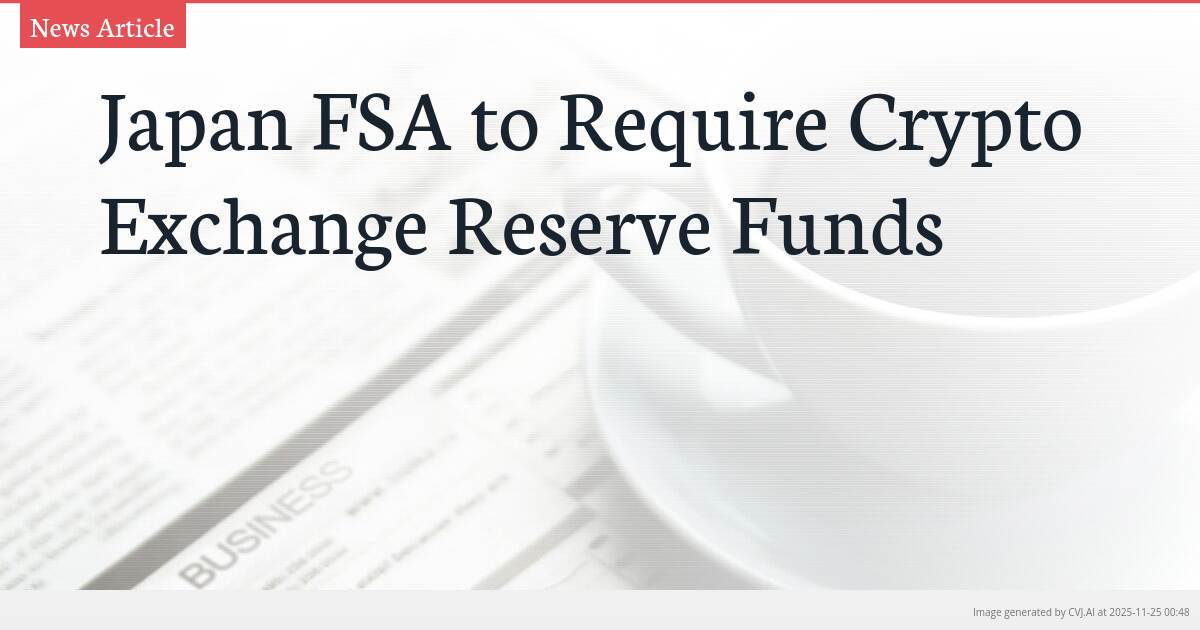Introduction
Japan’s Financial Services Agency is preparing to implement sweeping new regulations requiring cryptocurrency exchanges to maintain liability reserve funds, marking a significant step toward enhanced consumer protection in the digital asset space. The regulatory overhaul, prompted by recent high-profile security breaches at global exchanges, will mandate that companies establish dedicated reserves specifically for compensating users affected by hacks or other unforeseen events. This move represents Japan’s latest effort to balance innovation with investor safety in its rapidly evolving crypto market.
Key Points
- Advisory body Financial System Council to release report recommending mandatory reserve requirements for crypto firms
- Regulatory changes prompted by recent global exchange hacks highlighting security vulnerabilities
- New rules will require companies to establish liability reserve funds specifically for user compensation in security incidents
Regulatory Shift Following Global Security Incidents
The Financial Services Agency’s decision to require reserve funds comes as a direct response to recent security breaches that have plagued cryptocurrency exchanges worldwide. Japan’s financial watchdog specifically cited these global hacking incidents as the primary catalyst for the regulatory changes, highlighting how vulnerabilities in one part of the crypto ecosystem can have ripple effects across international markets. The FSA’s proactive stance demonstrates Japan’s commitment to learning from security failures elsewhere and implementing preventative measures before similar incidents occur within its jurisdiction.
This regulatory evolution follows Japan’s established pattern of taking a measured approach to cryptocurrency oversight. The country has consistently positioned itself as a leader in creating structured frameworks for digital asset operations, balancing innovation with consumer protection. The reserve requirement represents the latest in a series of calculated moves by Japanese regulators to ensure market stability while maintaining the country’s position as a crypto-friendly jurisdiction with robust safeguards.
Financial System Council's Advisory Role and Recommendations
The Financial System Council, serving as the official advisory body to Japan’s FSA, plays a crucial role in shaping the forthcoming regulatory changes. According to the Nikkei report, the council is scheduled to release a comprehensive report following its Wednesday meeting, outlining specific recommendations for implementing the reserve requirements. This advisory body brings together financial experts, industry representatives, and regulatory specialists to ensure that new policies are both practical and effective.
The council’s expected recommendation will require cryptocurrency firms to create dedicated liability reserve funds, marking a significant departure from current practices. These reserves would function similarly to insurance pools, ensuring that sufficient capital is available to compensate users immediately following security incidents rather than forcing customers to wait through potentially lengthy legal processes or bankruptcy proceedings. The structured approach through the Financial System Council ensures that regulatory changes undergo thorough review before implementation.
Implementation Framework and Industry Impact
The FSA’s revised requirements will establish clear guidelines for how cryptocurrency exchanges must maintain and manage their liability reserves. While specific details regarding reserve amounts and funding mechanisms will be clarified in the forthcoming regulations, the framework is expected to include provisions for regular auditing and reporting to ensure compliance. This structured approach aims to create a standardized safety net across all licensed exchanges operating in Japan.
For cryptocurrency companies operating in Japan, the new reserve requirements will necessitate significant operational adjustments and financial planning. Exchanges will need to allocate capital specifically for these reserve funds, potentially impacting their profitability models in the short term. However, the long-term benefits include increased consumer confidence, reduced legal exposure, and enhanced market stability. The regulations may also create competitive advantages for well-capitalized exchanges that can easily meet the reserve requirements.
The timing of these regulatory changes coincides with growing global attention to cryptocurrency consumer protection standards. Japan’s approach could serve as a model for other jurisdictions considering similar measures, particularly as the international regulatory landscape for digital assets continues to evolve. By implementing these requirements through its established Financial System Council advisory process, Japan demonstrates how mature financial systems can adapt to embrace emerging technologies while maintaining strong consumer protections.
📎 Source reference: cointelegraph.com

